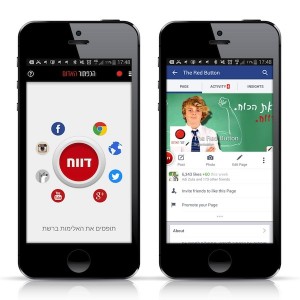Alon Bar-David, co-founder and co-chief executive officer of Red Button. (photo from Red Button)
While cyberbullying is a relatively new phenomenon, bullying is as old as human history. From the playground to the office to cyberspace, it is remarkably transferable from one platform to another. But three young Israelis have developed a technology to reduce its progress on the latter front – the Red Button.
Winner of a “Stop Cyberbullying” competition held in Israel three years ago, the app’s red button, when pressed, sends a screen shot to one of the many volunteers who work with Red Button. If the content is deemed inappropriate, it is reported to the website – whether that is Facebook, YouTube, Google or JoeSchmoe.com – so that the content can be removed.
In some cases, the Red Button team has permission to remove the content; in other instances, the content is relayed to cyberbullying police, schools, business owners or even hospitals, if need be.
“When we published the Red Button and it went on air in December 2013, we saw for the first time just how cruel cyberbullying can be,” said Alon Bar-David, 27, co-founder and co-chief executive officer of the nonprofit.
In Boston, working with a business accelerator there to bring the app to North America, Bar-David told the Independent, “As soon as we published the Red Button, we received a lot of response, a lot of requests and we finally understood just how big the problem is and how big our solution needs to be.”

When a user presses the button, an anonymous report is sent to the Red Button team. “They do not need to identify, they do not need to register,” explained Bar-David. “They only need to download it for free, press on the red button, and a screen print is sent to us.”
Currently, the app is available to Android users and it can be accessed via Google Chrome or Firefox. It can also be used as a web extension to the browsers. The company is working on an iPhone version.
Bar-David and the Red Button team receive hundreds of reports every day and there are dozens of volunteers who analyze them. When cyberbullying content is detected, the volunteers escalate the report to the appropriate place.
“Up until now, we’ve removed 95 percent of the [reported material] deemed to be cyberbullying,” said Bar-David. “We review the violence over the network in Israel. Before, no one was doing anything against the phenomena.
“We have access to many websites in Israel. We have a lot of power in our hands. We can really reduce cyberbullying.”
One of the most important ways Red Button is able to help is in suicide prevention. When the reports come in, they are directed to the suicide prevention police unit. “In 2014, we were able to help [prevent] more than 40 cases of attempted suicide and have a representative go to their home and save lives,” said Bar-David. “These are the only cases where an IP address is provided to police, so that they can get a location.”
Another big component is education. “We go to different schools every week and teach the kids what cyberbullying looks like, explaining what cyberbullying actually is,” said Bar-David. “Because most children, students, don’t know what cyberbullying is, they would not recognize it.”
The Red Button educators explain what it is. “More important than that,” he added, “they explain how to deal with the phenomena. They give them tools, the Red Button and a lot of other tools, and, every week, we go through different schools all over Israel.”
To find affordable, qualified staff, Red Button collaborates with Israeli universities. “The one that we have the biggest collaboration with is the Interdisciplinary Centre in Herzliya, Israel,” said Bar-David.
To generate interest from the general student population, the participating universities give school credits to the volunteers. There were more than 200 applicants last year to fill 50 spots.
“But the reason the students do it is because they think it’s important,” said Bar-David. “We only take students that really feel a connection to the issue we’re dealing with.”
As Red Button understands better than most, cyberbullying is a global problem. “We think that the Red Button should be all over the world because the cyberbullying phenomena isn’t just in Israel,” said Bar-David. “It’s a bigger issue all over the world, especially in the U.S. This is the reason we are here [in Boston]. We want to see the market here and see how to implement the Red Button here in the U.S.”
Bar-David is also interested in Red Button’s potential use in Canada. Noting that he just saw an article about cyberbullying on a Canadian news website, he said, “I understand if it gets to the news, that means the problem is very familiar in Canada. I hope we will be in Canada as soon as possible. Some people would like us there yesterday.”
For more information or to donate to Red Button, visit redbutton.org.il. While the site is only in Hebrew at the moment (the team is working on changing that), an English or Hebrew email can be sent to [email protected].
Rebeca Kuropatwa is a Winnipeg freelance writer.

